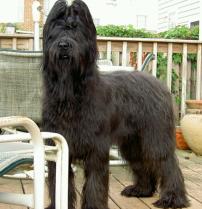A test has little to do with the thought process of bad guys. It is to determine the suitability of a dog for service, breeding, or simply competition depending on the particular discipline.
The muzzle is an interesting tool that is invaluable in training and testing police dogs.
It is completly unnatural for a dog to wear a muzzle in a fight. But, this is where the muzzle becomes such an important tool.
It tests the dogs desire to fight under stressful conditions, it helps determine whether or not a dog will fight a suspect without the presence of equipment.
The muzzle diminishes the prey attraction by the decoy. It also makes training in much more realistic situations possible.
No dog "likes" a muzzle. Some tolerate it and even learn to apply the muzzle as a battering ram. Others push, wrap their legs around, claw at, and try to rub off the muzzle.
Some just quit, won't chase, won't hunt, won't fight in a muzzle. The later group is generally unsuited to police work. Personally unsuited to breed, train in protection oriented sports, etc.
Now, being spectacular in the muzzle alone is not an absolute 100% answer to whether or not a dog is a good police dog. The dog may fight well in the muzzle but is too defensive, inhibiting its desire to search. Some dogs that have had extensive training in the muzzle do very well but in actual situation s do poorly. The oposit is also true. I had a superb police dog that wasn't started in muzzle work until well into his career. He would make a great initial contact in the muzzle, bashing the suspect hard but then fight the muzzle, being frustrated by not being able to use his mouth.
I've had another dog in my training group that was good in the muzzle but we dumped him because he was at the very lowest level on the road.
The muzzle is a great tool, one that is hard to replace. But, like everything else in dog work it must be taken as part of the whole picture.
In Germany the police from Northrhine-Westfalia do their certification test with all but one excercise in muzzle. Many consider their program the best in the world.
Ed has a video of some very nice dog sin a muzzle in the video on muzzle work for police dogs (I take a few really hard hits in the video, in one I actually get knocked out momentarily).
My current police dog doesn't like the muzzle, he will work in it but nothing real spectacular, yet a very capable police dog. My up and coming police/sport dog is also ho hum about the muzzle. Part of this is training, I just have no one that really understands muzzle decoy work, it takes a great actor, it takes a physical person that doesn't mind heavy contact, and someone who is not stuck into the stupid sport prey routine type of training.
Forgive me for sounding naive...I am quite new to all of this. I can understand how many dogs might shut down while wearing a muzzle, but how serious could a bark and hold really be from the detainee's perspective, if the dog is muzzled? I'm talking a real-life scenario. Isn't it the bite that would concern most would-be bad guys?
Tracy
 Previous Topic
Previous Topic Index
Index Next Topic
Next Topic












 Top
Top



.jpg)